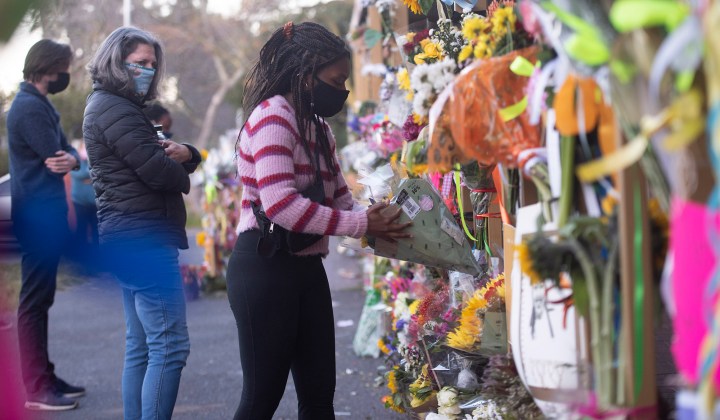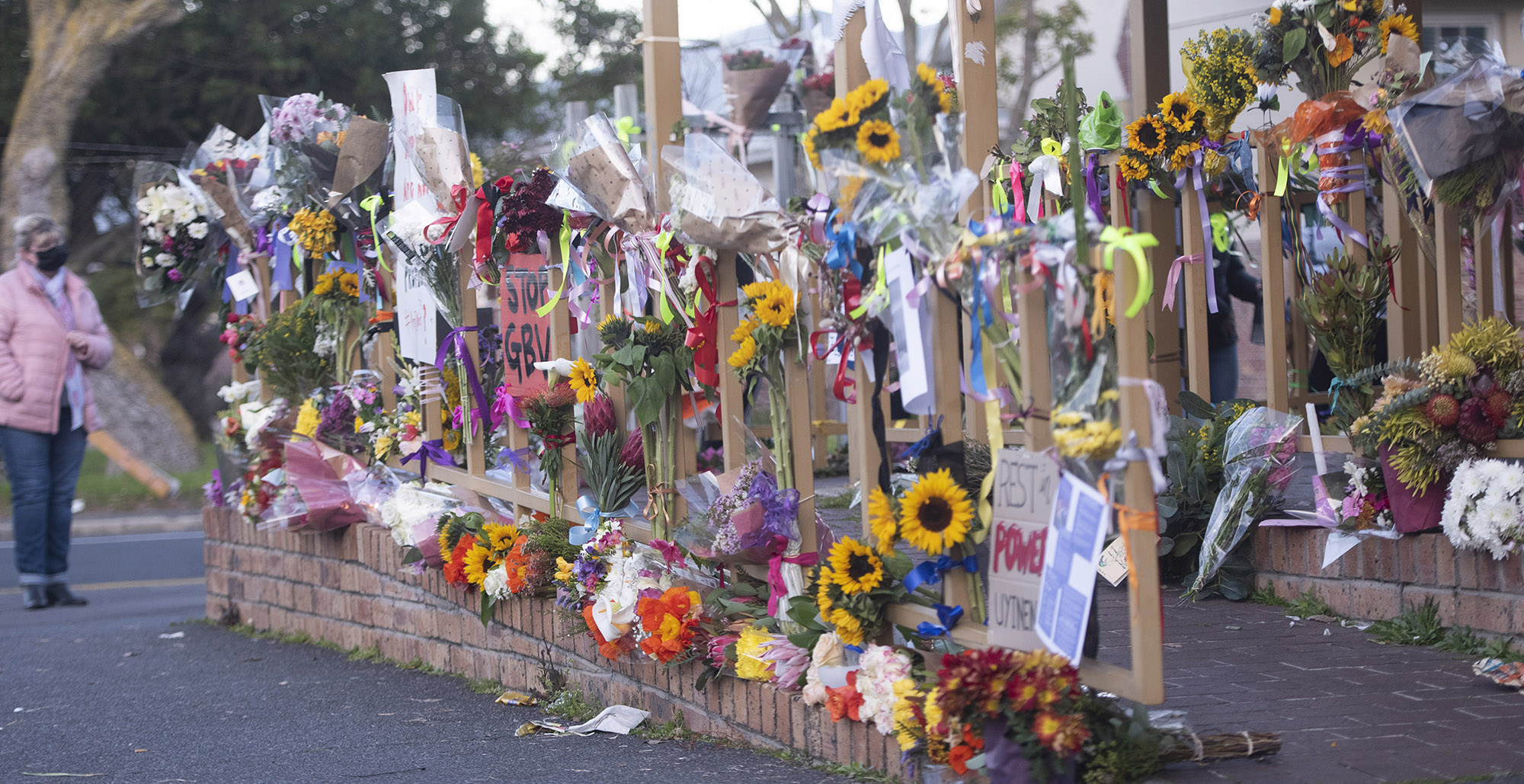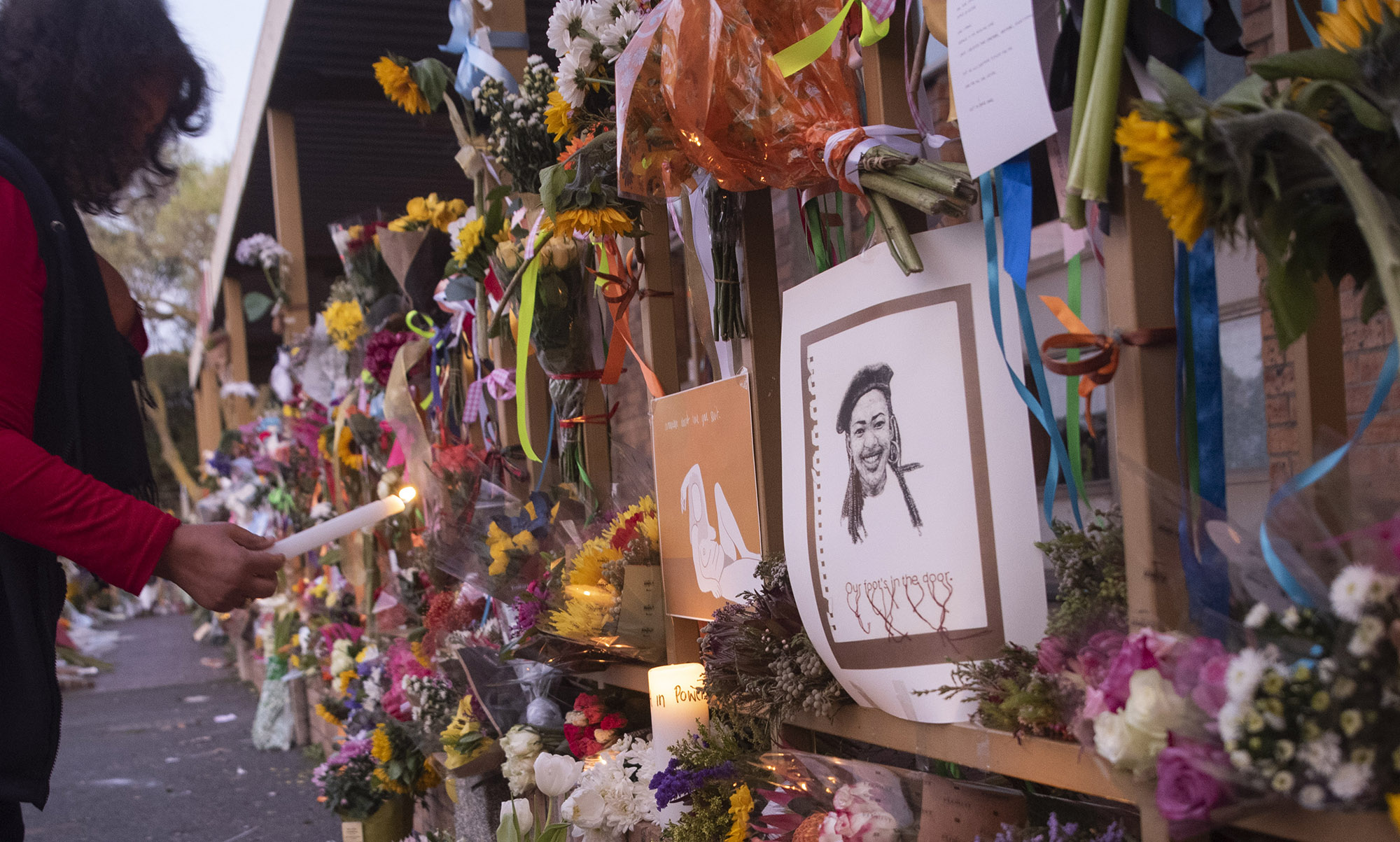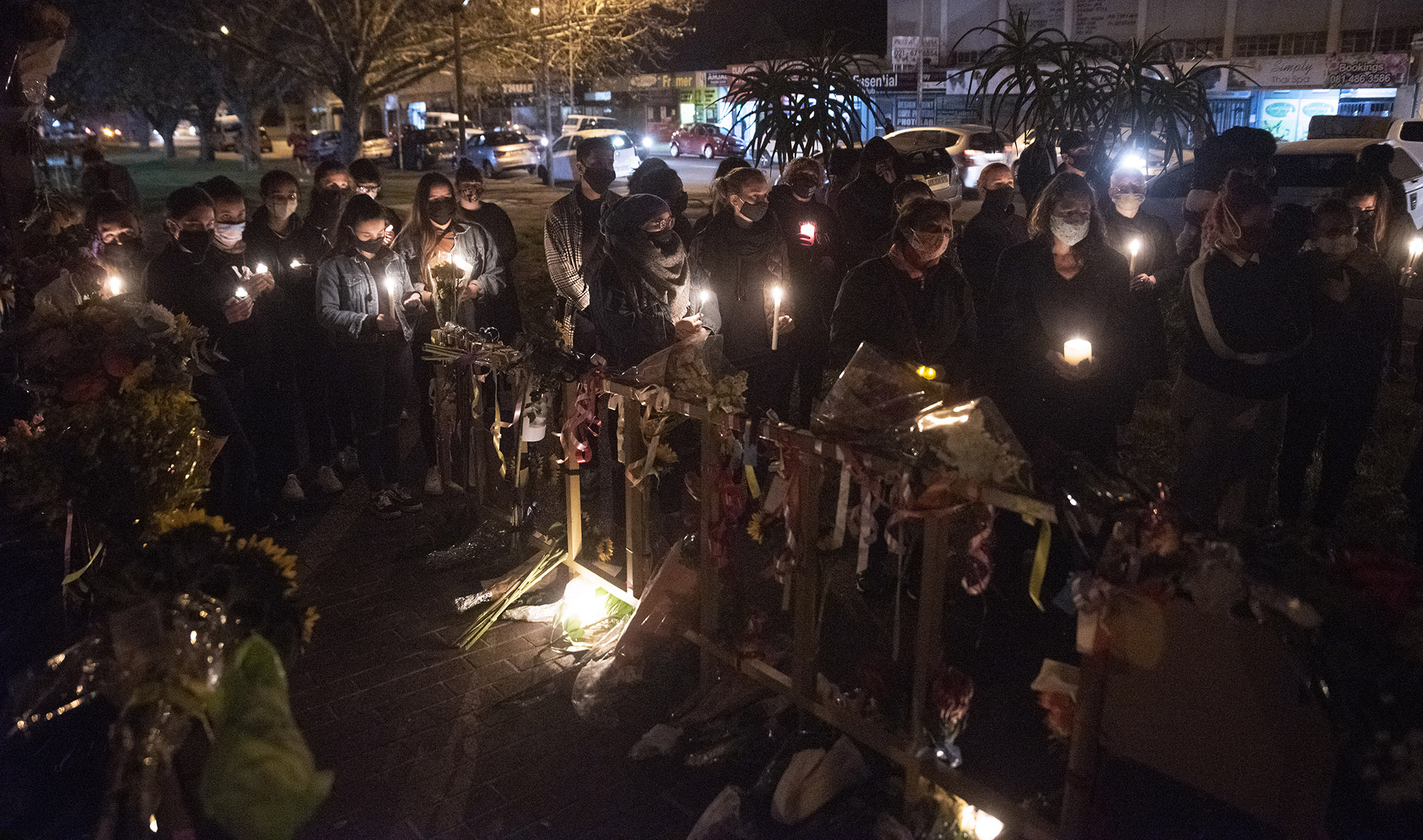Uyinene, One Year On
Access to justice for victims and survivors of sexual violence remains elusive

It’s been a year since 19-year-old UCT student Uyinene Mrwetyana was raped and murdered at a Cape Town post office. But civil society activists say slow progress has been made to improve the criminal justice system’s response to gender-based violence and femicide despite the government’s ‘rapid’ interventions.
Uyinene Mrwetyana was brutally killed by former Clareinch post office employee Luyanda Botha on 24 August 2019. Her body was dumped and set alight in a field in Lingelethu West, Khayelitsha. Botha is now serving three life sentences in prison and is not eligible for parole for 25 years.
After her horrific death shook the nation, Mrwetyana became the poster child for rising levels of gender-based violence (GBV), and a wave of protests ensued, culminating in a R1.6-billion Emergency Response Action Plan on Gender-based Violence and Femicide (ERAP), the report on which was made public on 30 April.

The outside of the Claremont Post Office in Cape Town was covered with flowers and messages on 24 August 2020, where UCT student Uyinene Mrwetyana was brutally raped and murdered a year ago. (Photo: Brenton Geach)
“It was clear that after Uyinene happened, another speech from the president was just not going to cut it. There was real action that was needed,” said civil society activist Onica Makwakwa.
Makwakwa is a director for the Feminists united to advance Women Inspired Solutions for Empowerment Collective (WISE) and served on the Interim Gender-based Violence and Femicide Steering Committee (IGBVF-SC). The committee led the implementation of the ERAP between 1 October 2019 and 31 March 2020 and drafted the National Strategic Plan on Gender-Based Violence and Femicide (NSP), a bold plan of action aimed at eradicating GBV by 2030.

Students arrive with flowers and candles at the Claremont Post Office in Cape Town. (Photo: Brenton Geach)
One of the ERAP’s key focus areas is access to justice for victims and survivors, which Makwakwa said is sorely lacking in South Africa.
“We know that there’s huge underreporting of GBV, largely because of this lacklustre performance by police and justice.”
The ERAP report details the outcome of the six-month intervention, which tackled a number of systemic problems like trying to clear the backlog of GBV cases, ensuring all police stations have evidence collection kits, building sexual offences courts and drafting legislation to hold perpetrators adequately accountable.

A woman lights candles at the Claremont Post Office. (Photo: Brenton Geach)
But have the ERAP’s interventions been effective in improving access to justice since its six-month implementation was concluded in March?
Department of Justice and Constitutional Development (DOJ&CD) spokesperson Chrispin Phiri said, “The lockdown had a massive impact on access to justice in general,” but failed to give a formal response to Daily Maverick’s queries regarding the ERAP.
In one instance, the DOJ&CD told Daily Maverick that some of our queries were “premature”, in particular those regarding progress on opposing bail, parole eligibility and the efficacy of protection orders.

People with candles on 24 August 2020 outside Claremont Post Office where UCT student Uyinene Mrwetyana was brutally raped and murdered a year ago. (Photo: Brenton Geach)
But, as Makwakwa emphasised, gender-based violence and femicide was declared a “national crisis” by President Cyril Ramaphosa in 2019 and should be treated as such.
“There should be a way that when you declare a state of emergency on an issue that it allows you to move quickly, the same way that it was done with Covid,” said Makwakwa.
Funding was reprioritised from the national Budget, and close to R400-million was set aside to address inefficiencies in the criminal justice system. However, the Presidency had not responded to queries regarding how much of the budget had been spent. The Department of Women, Youth and Persons with Disabilities also had not responded to questions on how much of the budget for this key area had been spent.
Cookie Edwards, the executive director of the KZN Network on Violence against Women, who also sat on the steering committee, says minimal funding has been given to civil society organisations to implement the ERAP on the ground.
“We as community-based organisations are the ones sitting with survivors, whether at the Thuthuzela Care Centre or the hospital at night, when government departments are asleep,” said Edwards.
She says the organisation, which works in Durban and a few surrounding areas, has limited reach because of funding restraints and she is emphatic that funding for community-based organisations needs to be prioritised.
Evidence collection and forensics
According to the ERAP, evidence collection kits had been delivered to all SAPS stations by the end of December 2019, and stock is being monitored in case of depletion or expiry.
Shortages of “rape kits” has been flagged as an ongoing issue at police stations.
“As WISE Collective we took it upon ourselves to recruit volunteers to help women go to police stations and inquire if they had evidence collection kits,” said Makwakwa.
In some cases, SAPS stations had no kits or the officer on duty who was questioned did not know what an evidence collection kit was.
Even when evidence collection kits are available, rape survivors often have to wait a long time for results from forensic analysis.
“Part of the reason why Uyinene’s case was able to be resolved as quickly as it was, was because the family got involved, UCT got involved and there were private detectives and private labs that basically helped to fast-track finding and verifying the DNA information,” said Makwakwa, who explained that the first 48 hours of a case are the most critical.
The ERAP set a target to clear the backlog of DNA samples related to GBVF at forensic labs. Close to 22,500 cases were backlogged and more than 35 years old. The SAPS had managed to finalise about 8% of the backlogged cases by the time the report was released, while 25,572 GBV cases were still in progress.
The SAPS had not responded to queries regarding the current backlog at the time of publication.
The ERAP mentioned that an additional report would be compiled detailing the stumbling blocks to processing the DNA results. It’s unclear whether this report has been finalised, but in the action plan, water interruptions, load shedding, budget cuts and inadequate resources were described as some of the inhibiting factors.
A further issue was that Eastern Cape doesn’t have a DNA testing lab. According to the report, SAPS was mandated to set up a lab but the tender for equipment had yet to be put out. Makwakwa claims that a van collects all the samples from the province and they are transported to Western Cape for analysis.
“Just imagine the level of exposure there.”
Clearing the backlog of old cases
A Cold Case Task Team should now be in operation in all provinces, according to the ERAP. A database of outstanding GBVF cases was established and over 24,000 dockets analysed, from which 94 arrests were made, the report said.
Makwakwa said clearing the backlog of cases is a crucial deterrent to crime. “If police are seen to be clearing the backlog, it sends a message that there is a level of zero tolerance emerging.”
Addressing the backlog may result in a spike in crime statistics, she said, but the figure should reduce over time.
The latest crime statistics from the lockdown period showed that domestic abuse and crimes against women and children had dropped. The SAPS recorded a 40% drop in rape cases and a 35% decrease in sexual assaults. The drop, however, was partially attributed to women being stuck at home with their abusers, which would make it difficult to report crimes.
Edwards said with courts being largely closed during a lockdown, women were reluctant to report cases. She said the number of cases reported to her organisation spiked when the alcohol ban was first lifted under Level 3. Now, in August, they’ve seen another spike, with 180 cases reported during the month.
“Now, with Level 2, more women are coming out and speaking up.”
‘Protection’ orders
One of the ERAP’s targets was to improve the efficiency and effectiveness of protection orders. Makwakwa said she’s seen cases where police have failed to deliver protection orders, or victims have died despite having a protection order in place.
Edwards says there’s often no urgency around protection orders. Last week she dealt with a case where the survivor was harassed by her abuser but police wouldn’t arrest him. When Edwards queried why this was the case, she was told it was because the woman was not facing any imminent “life-threatening danger”. She said this was unsurprising in the province known as the rape capital of South Africa.
Sometimes women don’t use the protection order to its fullest extent because they are still “emotionally dependent on the perpetrator,” said Edwards. Justice Minister Ronald Lamola announced in late July that the Domestic Violence Amendment Bill, if passed into law, would make provisions for online applications for protection orders.
Makwakwa says this is a step in the right direction as the current requirements for the efficacy of a protection order are problematic.
“You always have to have the piece of paper, which could get damaged or even torn by the abuser.”
She believes police should have an app where they can access protection orders via mobile.
No parole for sex offenders
“We want Minister Lamola to declare a moratorium on parole for sex offenders,” said Makwakwa, adding that there is enough evidence of repeat offence (recidivism). Several cases in the Western Cape, for example, were committed by repeat offenders on parole.
Moyhdian Pangarker, the man accused of murdering eight-year-old Tazne van Wyk, was an absconded parolee, and Reagan Gertse’s alleged killer, Jakobus Petoors, was out on parole after being convicted and sentenced to 12 years in prison for the rape of a five-year-old boy.
Sorrow and fury after parolee arrested for murder of eight-year-old Tazne
There were concerns when Lamola announced a Covid-19 parole dispensation in early May to ease overcrowding in prisons. But parole was not extended to those serving sentences for sexual offences, child abuse, murder and other serious crimes.
Lamola admitted that the parole system itself was deeply flawed and desperately needed to be reviewed. In a briefing held in March where he called for a “victim-centric parole system”, Lamola said victims of crime are often not informed when perpetrators are eligible for parole. Poor monitoring of parolees was another glaring issue.
The State should get serious about opposing bail
Everyone is afforded the right to apply for bail, but it can be opposed.
“The State is supposed to oppose bail 100% of the time,” says Makwakwa. Three bills have been tabled to strengthen legislation in this regard: the Criminal Matters Amendment Bill (Bail and Sentencing), the Domestic Violence Amendment Bill and the Criminal and Related Matters Amendment Bill.
“It is anticipated that Parliament would fast-track the approval of the aforementioned bills,” said National Prosecuting Authority spokesperson Sipho Ngwema.
The bills also deal with the National Register of Sex Offenders (NRSO), which civil society has demanded be made public. The register is a record of names of those found guilty of sexual offences against children and mentally disabled people. The Criminal Law (Sexual Offences and Related Matters) Amendment Bill, will broaden the scope of the NRSO to include all vulnerable groups but it remains a confidential document.
The NPA instructed the directors of public prosecution offices (DPP) that bail, where an accused is charged with an offence that falls within the ambit of GBVF, should be opposed as far as possible within the merits of each case.
“The prosecutor can oppose bail, but the ultimate decision on the granting of bail falls within the discretion of the presiding officer,” Ngwema explained.
According to Makwakwa, WISE Collective has on several occasions joined cases as amicus curiae and submitted petitions to oppose bail. Circling back to forensic analysis, she says it is a key part of the State putting together a “tight case” to prove to the court that a sex offender should be denied bail.
Daily Maverick asked the NPA if bail statistics had changed since the ERAP:
“Bail statistics for rape and murder of children are not available, only statistics on formal bail applications in general,” said Ngwema.
For Makwakwa, although access to justice is vital, the bulk of the funding from the ERAP should go towards preventative programmes.
“Because, by the time we get to addressing victims and survivors, people have already been violated.”
Edwards says the ERAP and the NSP on gender-based violence and femicide will only be effective if the government works hand in hand with civil society. DM


















 Become an Insider
Become an Insider